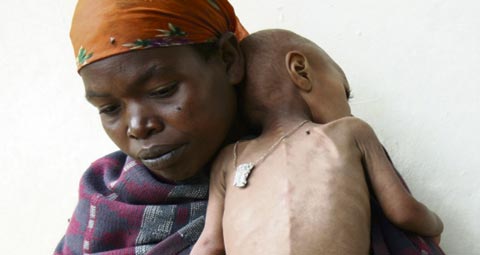BY Martin Dunlop | July 8 | ![]() 0 COMMENTS
0 COMMENTS ![]() print
print

CAFOD responds to Ethiopian crisis
— Catholic aid agency sets up emergency fund after country suffers devastating droughts
The official Catholic aid agency of England and Wales has set up an emergency response fund as many countries in the East and Horn of Africa face the ‘worst droughts in 60 years.’
CAFOD also welcomed a UK government pledge of £38 million in food aid to Ethiopia, which was announced at the weekend, but said that other countries would also have to help in order to avoid catastrophe.
Andrew Mitchell, the international development secretary, said on Sunday that the World Food Programme aid could feed 1.3 million people for three months and would also help treat 329,000 malnourished children and mothers.
Grave situation
“We cannot underestimate the gravity of the situation,” a spokesman for CAFOD said. “The rains have gone, the crops have failed, livestock are dying, and thousands of people are migrating in search of food but with nowhere better to go. There is nothing on the horizon that will improve that picture, and every indication it will get much, much worse.
“So Andrew Mitchell’s announcement is welcome and essential, but we need to see the same sense of urgency from other governments.”
Announcing the UK’s pledge at the weekend, Mr Mitchell also warned that other countries across the world must give money if a full-scale disaster was to be avoided.
“Through no fault of its own, the Horn of Africa is experiencing a severe drought caused by the failed rains,” he said. “Britain is acting quickly and decisively in Ethiopia to stop this crisis becoming a catastrophe. We will provide vital food to help 1.3 million people through the next three months. This situation needs an international response and Britain is calling on the international community to provide fast, effective relief.”
Drought
Eight million people are facing food and water shortages as a drought worsens in the East and Horn of Africa. Poor rains in East Africa have led to failed harvests, serious water and pasture shortages, and the deaths of thousands of animals.
The drought is a result of the La Nina phenomenon: lower than normal temperatures in the Pacific Ocean have had serious effects on weather conditions around the world. In many areas of East Africa, the rains that usually fall from March to June were far less heavy than usual.
The East Africa region is still recovering from one of the worst droughts in recent history. More than 20 million people faced life-threatening shortages of food and water in 2009 following successive years of failed rains.
“This is an ongoing crisis, which becomes more severe every couple of years,” Fergus Conmee, from CAFOD’s humanitarian team, said. “That’s why we can’t just deliver food and water. We need to find ways to reduce the impact of future droughts.”











